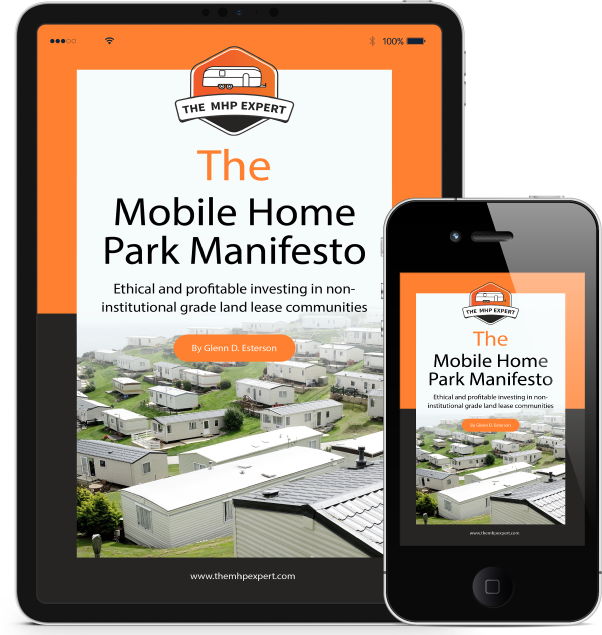Many investors are sleeping on one of the most lucrative real estate assets out there: mobile home parks. But what makes mobile home parks the hidden treasures in the real estate market? A little background knowledge: Highly restrictive zoning laws have made the prospect of building a new park essentially impossible — but the demand for manufactured housing is still thriving. Fewer than 1% of mobile homes shut down per year, according to a study from real estate advisory firm Lilly & Company. Mobile home parks are a supply-demand anomaly. So how do you know if mobile home park investing is a good option for you? We have 5 criteria for those considering an MHP investment.
1. You’re Interested in a Low-Cost Investment
Just because you don’t have a lot of starting capital doesn’t mean you can’t easily enter the real estate investing game. Yes, you will need cash, at least $100,000 and good credit to qualify for most loans to get started with purchasing mobile home parks. The typical down-payment ranges from 20-30% down. The price per occupied lot can vary greatly depending on size, quality, and location. Most parks have a price in the $10,000 to $30,000 per lot for most parks, and with a cash purchase the annual returns will likely be in the 8-12% range before applying any debt. Utilizing conventional bank debt, the returns tend to jump to 15-20% on an average deal. For a new investor, the mobile home park market presents a relatively low barrier to entry compared to other real estate assets. This is partly because you, as the park owner, own the land and the lots but not necessarily the units themselves — although owning the units and renting them can generate even more cash flow if done properly.
2. You’re Looking for a Lower-Risk Investment
One of the prevailing benefits of the mobile home industry is its overall stability. Mobile home parks that are primarily a lot-rental community experience less tenant turnover than multi-family properties because “Lot-Rent Only” tenants generally are looking for affordability and long-term ownership. In the Southeast, outside of major metros, the average lot rent rental rate is around $200. Some areas are in the low $100 per month. This offers the buyer a “no-where-to-go-but-up” plan on the rents. Think about it: Where else can you live for $200 or less? Nowhere. And that number nearly doubled over the past couple years. In fact, on my first park purchase, the lot rents were as low as $85, a year later they were all at $150, and then eventually $200. The higher your park’s lot count, the more you spread out financial risk, meaning that if a tenant leaves, your park’s net operating income is not as heavily impacted as with some multi-family properties.
3. You’re Eager to Learn
Whether you’re fresh to real estate investing or a seasoned veteran, mobile home park investments present benefits and challenges unique to the real estate industry. These investments require a willingness to learn the MHP industry, its tenancy, and its operating best practices in order to truly maximize your park’s returns. Correcting previous ownerships lack of efficiencies presents another opportunity to increase our cash flow, since most “Mom & Pop” owners have serious inefficiencies in their operating plan. It’s recommended you work with a mobile home park broker or advisor who specializes in the industry and can provide further insight before you commit to purchasing a park.
4. You Want a Reliable Stream of Cash Flow
The lower risk of mobile home parks coupled with the aforementioned benefits present a huge opportunity to grow consistent cash flow from your park. Let’s say you invest in a 60-pad property at $10,000 per unit, and charge $150/mo. in rent. After reviewing the income and expenses and using standard evaluation metrics, you realize that this park is currently producing a 10% unlevered return, also called a CAP rate. After the acquisition, you increase the rent charge $250/mo. in rent. That totals $180,000 in annual revenue. A typical figure for your park’s operating expenses (of which there are relatively less compared to other real estate assets) might be something like 35% – 45% of gross revenue, or roughly $63,000 annually. That means you’re looking at $117,000 in annual net operating income (NOI). And considering your purchase price, the cap rate (the unlevered expected rate of return commonly used in commercial real estate) of your park is around 19.5%. For reference, the average cap rate for multi-family apartments is approximately 5.5%.
If your park tenants own their own mobile home properties, you as owner and park manager can enforce property mandates without having to involve yourself in actual maintenance of the home, which greatly reduces your operating costs and improves the curb appeal aspect of the park.
5. You’re Tired of the Competition in Other Real Estate Markets
Wanting to break away from the pack? According to Green Street Advisors, a leading real estate research and advisory firm, very few new mobile home parks have been built in the last two decades due to strict zoning and planning laws that don’t allow for MHP developments anymore. Contrast that with apartment buildings; over 350,000 new apartment units were built in 2017 alone. The MHP industry, without a huge investor pool or competition, enables MHP investors to profit significantly from a vast swath of Americans who seek out affordable housing communities.
Learn How Glenn Esterson Can Secure the Right MHP Deal for You
The purchase of a mobile home park can be one of the most singularly profitable real estate investments you can make, if you know what you’re doing.
If you’re interested in purchasing a mobile home park, Glenn Esterson provides the expert guidance and partnership you need to make these complex processes feel simple. As you test the market, our advisory and brokerage services can help you find the right investment.


